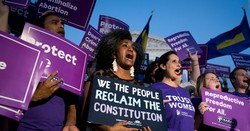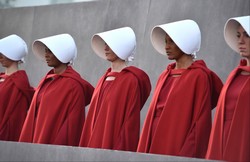Supreme Court nominee Judge Brett Kavanaugh attended a hearing with Senators to discuss his stance on abortion on Tuesday, Sept. 4.
A group of women dressed in red gowns and white caps stood outside of the hearing room in silent protest.
As the hearings continue for Kavanaugh’s confirmation, protests from groups opposing his appointment have increased.
During Kavanaugh’s testimony on abortion, fifteen women lined the balcony above the hearing room, overlooking the Senate offices.
The women’s costumes were meant to carry a solemn message from Margaret Atwood’s dystopian novel A Handmaid’s Tale, which portrays a world wherein women are devoid of basic human rights: namely, control over their own bodies.
These women are members of Demand Justice, an organization which strongly opposes Kavanaugh’s confirmation based on his prior rulings on abortion and healthcare as a U.S. Court of Appeals Judge.
Protests have not only taken place outside of Congress and the Supreme Court in Washington, D.C., but also through fundraising to target Senators who are undecided about their confirmation vote.
Many activists involved have been arrested for disrupting the confirmation hearings, protesting their concerns over Kavanaugh’s stance on social issues. These protests have led to criticism from Senators, such as Republican Benjamin Sasse from Nebraska, who claims that the Supreme Court is not the appropriate venue to debate politics.
 Kavanaugh, who is affiliated with the Republican Party, and had formerly served under President George W. Bush, has been appointed to replace Justice Anthony Kennedy after he announced that he would be retiring.
Kavanaugh, who is affiliated with the Republican Party, and had formerly served under President George W. Bush, has been appointed to replace Justice Anthony Kennedy after he announced that he would be retiring.
Known for being moderate on social issues, Kennedy has ruled in favor of abortion rights and marriage equality, cases that Kavanaugh’s protestors claim will be overturned if he were confirmed and replaces Kennedy.
“We cannot completely remove ideology from how we interpret the constitution or how judges evaluate cases,” said Brendan Wright, Ph.D., an adjunct professor of political science. “Since we need to recognize that ideology influences both constitutional and political thinking, it seems crucial for Senators to at least consider a candidate’s ideology before voting them onto the highest court in the land.”
Joseph Patten, Ph.D., Chair of the Department of Political Science and Sociology, and an associate professor of political science, agrees that it is fair to assess Kavanaugh’s personal beliefs, and that Senators should work to determine whether or not he is willing to overturn Supreme Court cases that many have deemed settled law, such as Roe v. Wade.
“We are living in a very intensely partisan era, so it is hard to think that it would apply to everything except judicial selection,” Patten said.
“That said, the stakes are very high and there are a lot of people who care about the issue of abortion rights, as well as the Russian investigation with Trump and the scope of presidential powers,” he added.
Kevin Chang, a senior history student, was not surprised by the disputes over Kavanaugh’s political views. “Presidents usually appoint judges who seem to have a similar political ideology to their own,” he said. “In other words, a president with a liberal ideology will usually appoint liberals to the courts. Likewise, conservative presidents tend to appoint conservatives.”
Kavanaugh has described Roe v. Wade, the 1973 case that established the lawful right to abortion as “settled law” when speaking with Republican Senator Susan Collins from Maine; but Planned Parenthood Action called Kavanaugh’s claims “hollow words” on Twitter, based off of Kavanaugh’s past verdicts and Trump’s remarks that he would nominate pro-life justices.
“[Kavanaugh] is a threat to people’s constitutional rights,” writes Planned Parenthood Action in their tweet.
“Brett Kavanaugh was advanced to be a Supreme Court Justice for the single-minded focus in overturning Roe v. Wade,” said Katherine Parkin, a professor of history and gender studies.
“The White House only secured names from the Heritage Foundation, ensuring that their nominee was committed to overturning Roe v. Wade,” she continued.”
“Opponents’ of Roe v. Wade singular objective is to secure an anti-choice Justice and many have ‘held their noses’ to support President Trump to achieve that aim. Certainly the Heritage Foundation and the White House are going to deliver such a Justice, even if Kavanaugh is undone,” Parkin added.
With evidence amassing that the Trump Administration might attempt to revisit Roe v. Wade, the female activists’ decision to wear the attire of handmaids is significant.
According to Corey Wrenn, Ph. D., a lecturer of sociology and gender studies, “…feminists are smart to capitalize on this pop culture in order for their message to resonate in a visually compelling way.”
“We’ve come a long way from the point in history in which women’s bodies were fully controlled,” she continued. “Today, women’s barriers to education have been greatly reduced; with this education comes a greater confidence in what women are entitled to, greater knowledge about changing the system, and greater propensity for resistance,” said Wrenn.
Others like Amanda Connelly, an adjunct Professor of English, worry that “we are a lot closer to work of dystopian fiction [as portrayed in A Handmaid’s Tale] than many of us want to believe.” She thinks that “[the handmaid activists represent] what many women in this country fear: a future with even less body autonomy.”
“Between [Kavanaugh’s] views on abortion and the latest sexual misconduct allegation, it is clear that he would not fight to support women’s rights,” Connelly concluded.
In the verdict of Roe v. Wade, a woman’s right to privacy extended to her decision to have an abortion; this right is protected under the 14th Amendment.
Brittany Macaluso, a sophomore social work student, said, “As a woman, the right to privacy is important.” She uses herself as an example stating, “Although I would not get an abortion for personal reasons, it is my choice.” She believes that her choice is private and should not impact another’s decision either.
When Democratic Senator Kamala Harris from California asked Kavanaugh to name a “law that gives the government the power to make decisions about the male body” during one of his hearings, he was at a loss for words, stating, “Uh, I’m happy to answer more specific questions…”
“Congress would [never] deem it necessary for a similar law acting upon males… This is just another way the male is trying to ‘dominate’ the female, and it is disturbing,” Matt Natale, a sophomore English student asserted.
“To me, it’s unlawful to force a woman to do anything to her body… Privacy is our assurance of security, and should be valid regardless of gender and situations,” said Natale.
Although, under the law, Roe v. Wade, women may have access to receive an abortion, Parkin explains that a vast majority of U.S. women have already, “Through local and state laws, intimidation and violence, and limited resources, been limited in their ability to access abortions.”
“Kavanaugh’s appointment, or even if he is done in by the accusation of sexual assault, or that of his successor, will strive to make abortion illegal and further contribute to women’s limited ability to control their reproduction,” she continued.
With Republicans holding a small 51-49 majority in the Senate, pressure from activists who are worried that Kavanaugh subscribes to an anti-abortion legal philosophy have led to millions of dollars being raised against Senators who could potentially vote for him.
Activists have been targeting moderate Republican Senators, such as Collins, who has recently made news for receiving over 3,000 coat hangers from abortion-rights groups, serving as a reminder to the days when abortion was illegal, and women were forced to use extremely dangerous methods to end unwanted pregnancies because they did not have access to safe medical procedures.
“Anti-choice proponents have always rejected efforts to reduce pregnancies, only supporting the completely-ineffective abstinence only message in high schools and ensnaring that Plan B and other preventative prescriptive efforts with religious posturing on our nation’s preeminent Food and Drug Administration approval body,” Parkin explained.
Tameah Young, a sophomore political science student, believes that forcing a woman to have a child she does not want, would result in the mother harboring underlying resentment for the child.
Young affirms that “the only people who should make choices regarding women’s health are women.”
The Senate Judiciary Committee has scheduled to vote to recommend Kavanaugh to the entire Senate this Thursday, Sept. 20.
However, after allegations of sexual assault have been levied against the nominee, many Senators have called for a postponement.
Kavanaugh and Christine Blasey Ford, a California professor accusing him of sexual assault, will testify before the Senate Judiciary Committee next Monday, Sept. 24.
IMAGINE TAKEN from IndieWire
IMAGE TAKEN from Morning Update News



